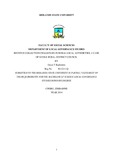Please use this identifier to cite or link to this item:
https://cris.library.msu.ac.zw//handle/11408/2449| Title: | Revenue collection challenges in rural local authorities, A Case of Kusile Rural District Council. | Authors: | Kucherera, Grace T. | Keywords: | Revenue collection. Rural local authorities. |
Issue Date: | Nov-2014 | Publisher: | Midlands State University | Abstract: | Local authorities generally are autonomous bodies governed by pieces of legislation and derive their powers from these governing legislations. Rural local authorities in Zimbabwe are governed by the constitution, Rural District Councils Act and the Traditional Leaders act in particular. It is in the Rural District Councils Act where the sources of revenue for these local authorities are provided. The study therefore sought to identify the challenges that rural local authorities face in the collection of revenue as well as counter solutions to those problems. In an attempt to identify the challenges the sources of revenue for Kusile Rural District Council which is the study center were highlighted first as well as their sustainability. The study population was 4250people while the sample population was 64 participants. Purposive sampling was used for selectiong heads of departments and employees to participate in the study. Heads of departments and employees were selected on the basis of the nature of their jobs which revolves around revenue collection and management of council funds. Simple random sampling was used to select councillors to participate in the study while systematic random sampling was used to select households to participate in the study. Strategies of revenue collection used by Kusile Rural District Council were also brought to light so as to identify other strategies that could be employed by Kusile Rural District Council to improve on its revenue collection. Interviews, questionnaires and observations were used to gather data and graphs, charts and narrations were used to present findings from field research. The research found out that only local authority employees were responsible for revenue collection and there was no community involvement when discussing unit charges which is a demotivating factor for rate payers. The researcher recommended the involvement of elected officials of council and traditional leaders in the collection of revenue as well as enforcing measures at these grassroots structures to ensure people pay their rates. | URI: | http://hdl.handle.net/11408/2449 |
| Appears in Collections: | Bsc Local Governance Studies Honours Degree |
Files in This Item:
| File | Description | Size | Format | |
|---|---|---|---|---|
| Kucherera.pdf | Full text | 902.78 kB | Adobe PDF |  View/Open |
Page view(s)
252
checked on Feb 14, 2026
Download(s)
128
checked on Feb 14, 2026
Google ScholarTM
Check
Items in MSUIR are protected by copyright, with all rights reserved, unless otherwise indicated.



